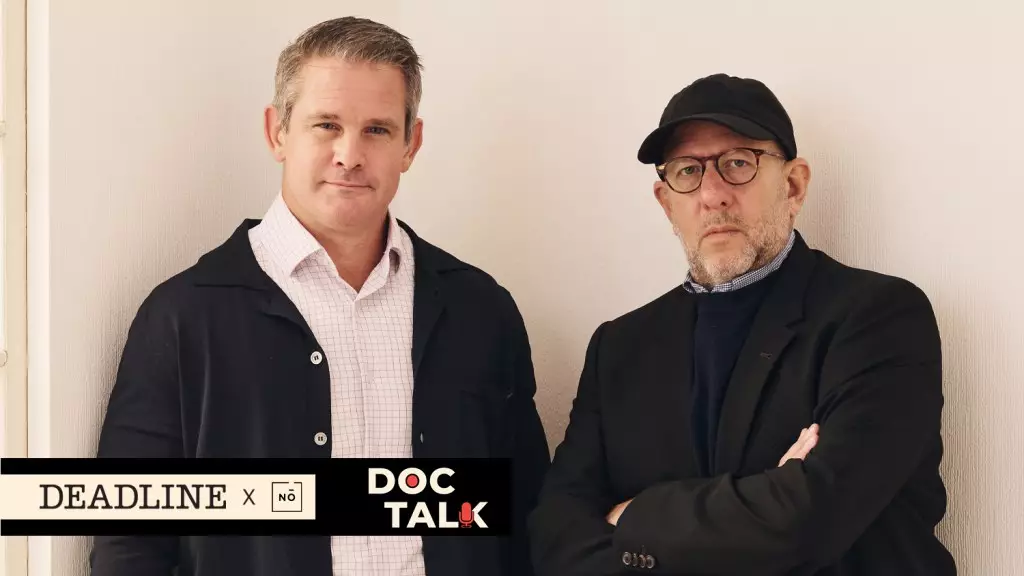In an era where political allegiance often translates into personal safety and familial bonds, former Republican Congressman Adam Kinzinger’s decision to break ranks from Donald Trump has not only made him a figure of admiration among Democrats but has also set the stage for a harrowing personal saga. Kinzinger, who courageously took a stand by joining the January 6th select congressional committee, is emblematic of what happens when integrity collides with toxic partisanship. His actions have drawn a barrage of threats, not merely directed at himself but also at his loved ones, showcasing the grim reality for those willing to challenge the status quo.
The fallout from his principled stand has been devastating. With his life uprooted by persistent death threats from Trump supporters, Kinzinger’s story serves as a cauterizing reminder of how deep-seated loyalty can manifest in aggression towards perceived traitors. As Kinzinger narrates his experiences, the chilling impact on his family is painfully evident; even his parents have faced estrangement from friends and family who disagree with his choices. The price of his political integrity is steep, raised against the backdrop of a party that once celebrated his rise.
At the Toronto International Film Festival, Kinzinger shared his narrative through the lens of a new documentary titled *The Last Republican*, directed by Steve Pink. The documentary tracks Kinzinger’s transformation from celebrated Republican leader to ostracized figure effectively captures the tumultuous nature of contemporary American politics. Pink’s partnership with Kinzinger is particularly compelling as it highlights an unusual alliance between a conservative politician and a liberal filmmaker. They bond over shared interests that transcend their political ideologies, demonstrating that common ground can indeed exist even amid profound political divides.
Kinzinger’s participation in the January 6th committee significantly altered the narrative arcs of his political career. He doesn’t shy away from the rhetoric of regret, expressing a haunting sentiment that resonates within the GOP’s current factional struggle. His admission of a missed opportunity to “lead a coup” within his own party underscores the complexity of loyalty in modern politics, where the willingness to adapt and challenge authoritarian tendencies remains an uphill battle. This insight into his psyche invites broader reflections on the moral responsibilities of politicians: to uphold democratic values over party allegiance.
The electric atmosphere of TIFF was not solely a backdrop for Kinzinger’s revelations; it was a platform for discussing diverse themes in documentary filmmaking. Alongside other interviews, the festival unveiled a multitude of works, ranging from Malala Yousafzai’s insights in *The Last of the Sea Women* to Raoul Peck’s engaging conversations about his documentary *Ernest Cole: Lost and Found*. These films present narratives that give texture to the multifaceted stories shaping our world today.
Moreover, music-themed documentaries garnered attention, with discussions featuring industry icons like Pharrell Williams and his revolutionary animation project *Piece by Piece*, where luminaries of the music world find themselves depicted in Lego form. Such innovative storytelling approaches reflect the ongoing evolution of documentaries, offering fresh perspectives on both the personal and cultural narratives at play.
The convergence of Kinzinger’s plight with these films paints a vivid portrait of an increasingly fragmented society. How do we as a people bridge the divides created by differing opinions and irreconcilable allegiances? Kinzinger’s story opens the door to these conversations, urging viewers and listeners alike to seek understanding amidst the noise.
As the podcast *Doc Talk* hosted by John Ridley delves into these themes, it reiterates that the pursuit of truth often comes with significant sacrifices. Adam Kinzinger stands as a testament to this reality. His journey reveals not only the tumult within the GOP but also the larger struggle for principled leadership in today’s politically polarized climate. In reflecting on Kinzinger’s experiences, we are reminded that courage, though costly, is often the catalyst for meaningful change, both personally and politically.
Kinzinger’s story and the narratives shared at TIFF encourage a deeper understanding of the complexities of American political life and the vital importance of integrity in the face of adversity.


Leave a Reply